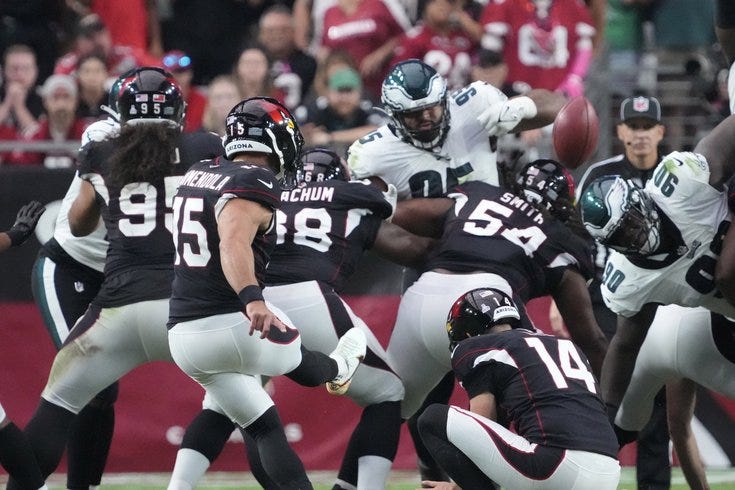Why Did the Kicker Miss the Kick?
First off, getting a kicking job in the National Football League is next to impossible; over 254 college football programs in the United States at the FBS and FCS levels collectively make up what is called Division 1.
Kickers from lower divisions rarely, if ever, make it to the NFL.
Of the 254 kickers in college, roughly 25% graduate yearly, which translates to 64 (if we round up).
There are only 32 NFL teams. And most teams have a kicker that was with the team in the previous season.
Every year, the average amount of new kickers (by that, I mean kickers that weren’t on the team the previous year) is often less than 5.
Kicker jobs rarely open up, and if they do, it’s usually by injury or poor performance. Looking at the list of NFL kickers for this year, only three are under 24. Cade York, the placekicker for the Cleveland Browns, is the only drafted rookie kicker in the NFL.
That’s another thing; most teams don’t use draft picks on kickers. They would much rather sign an undrafted free agent, which means you are trying out against as many as 6-7 kickers for a job (when they become available, of course)
While watching the Philadelphia Eagles play the Arizona Cardinals, the game was hard-fought on both sides. The Cardinals needed a field goal to tie the contest and, in all likelihood, force overtime.
Arizona’s full-time kicker, Matt Prater, was injured the previous week, which meant they needed to sign a temporary replacement. Matt Ammendola.
Ammendola, who ironically was born in Philadelphia and grew up nearby, was a good kicker in college at Oklahoma State University. Kickers often have to excel even to get a tryout in the NFL.
In college, Ammedola made 76.9 of his field goals; there were undoubtedly more accurate kickers in his class. Five of them are NFL players now. Still, despite this, Ammendola got a tryout in the NFL and did well, getting an opportunity with the New York Jets in 2020 and then the Kansas City Chiefs for two games before ending up with Arizona.
During warmups before last night’s game, the broadcast showed Ammendola missing multiple kicks to the right of the upright.
Kicking a football is hard so in no way do I want to minimize what Ammendola does, which is better than virtually anyone else in the world.
Fast forward to this kick at the end of the game, a high-pressure kick. Not just because the team would lose if Ammendola missed it, but it could also cost him his job, and he may not get another opportunity.
The average field goal percentage in the NFL is 82.7% which is higher than Ammendola ever achieved in college.
Your mindset must change to go past what you’ve done before.
The Eagles called timeout as Ammendola stepped up to kick the field goal. This tactic is known as icing the kicker. It has some success, according to Sharp Football Analysis, which determined that kickers only made 64% of their kicks after being iced, which is lower than the league average.
Ammendola subsequently missed the kick, and the Cardinals lost. The Cardinals did not lose solely because of the kicker, but to the casual fan, they (kickers) get an excessive amount of blame.
Because I study mindset, I thought about what must have been going through Ammendola’s mind. I don’t know him personally but let’s speculate what he was thinking.
This is my shot at making the team
This might be my last shot
This kick could help beat my hometown team
Don’t miss
Focus!
The mindset of a kicker can be more fragile than other football players because of a variety of factors:
Kickers:
don’t kick much (most kickers are on the field for less than a minute of game time)
have a lot of time to think between kicks
are not considered real football players
have a margin of error that is razor-thin
Because kickers have so much time to think, the mind can invent ways to derail them. It’s the same way in life; one reason we should execute quickly: the more time we have to think, the less likely we do the thing we set out to do.
We typically experience a regression to the mean in pressure situations. We go back to our norm.
Ammendola was good in college but wasn’t automatic; he made roughly 3 of every four kicks.
In yesterday’s game, he attempted four kicks, making the first 3, 2 extra points, and a field goal.
Ammendola missed the 4th, the one that ended the game.
He went back to his mean at the worst possible time.
I have learned that peak performance is more about raising the mean other than having an extraordinary month.
If you’re a sales person, let’s say your average is five closings a month and you can deliver that no matter what is going on in your life, you are more valuable to the company than a person who closes 10 one month and then closes one for four months.
One is predictable, and the other is random.
Creating predictability in unpredictable conditions leads to peak performance.




